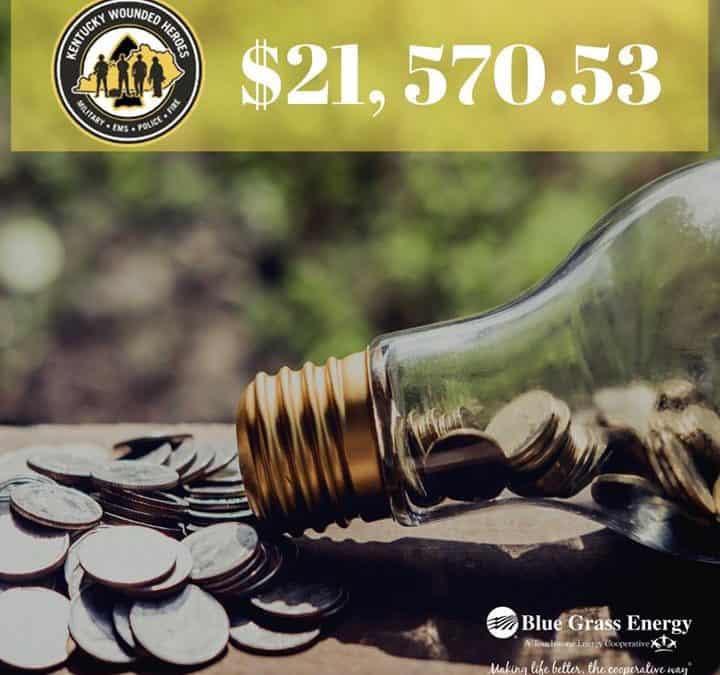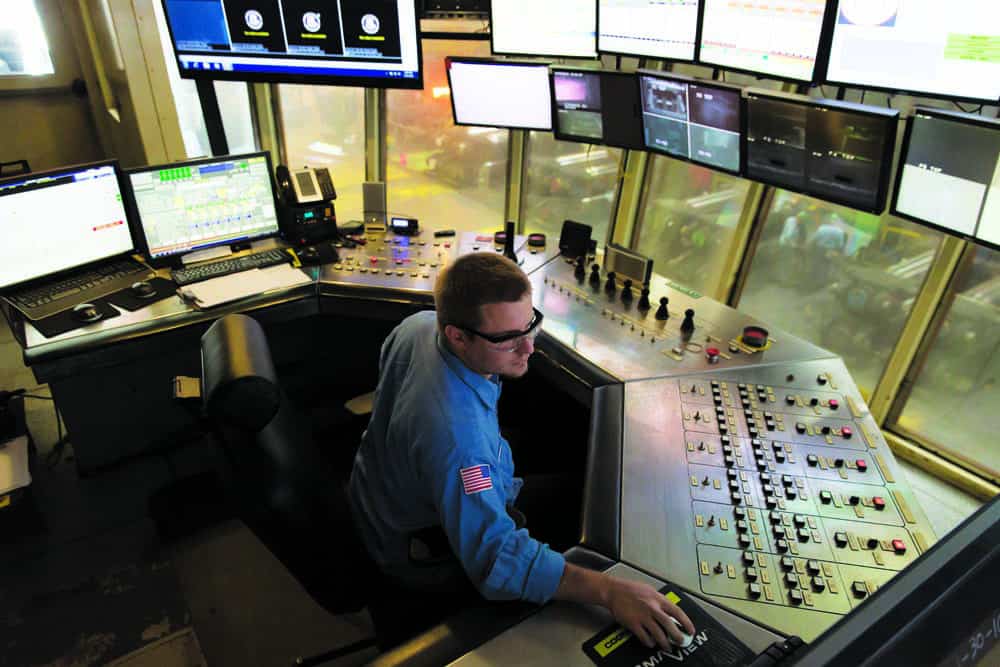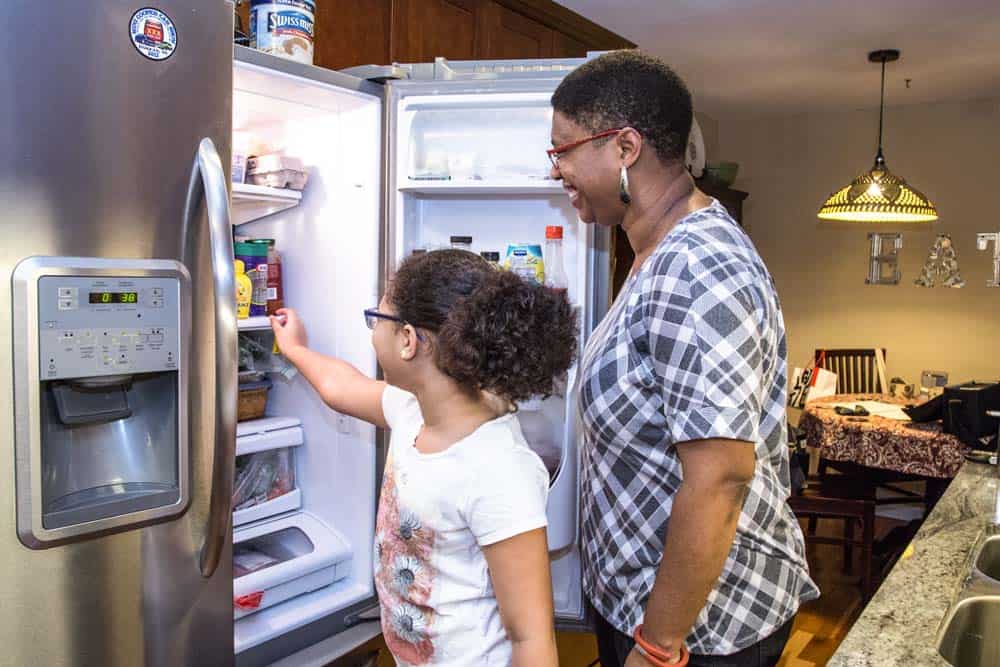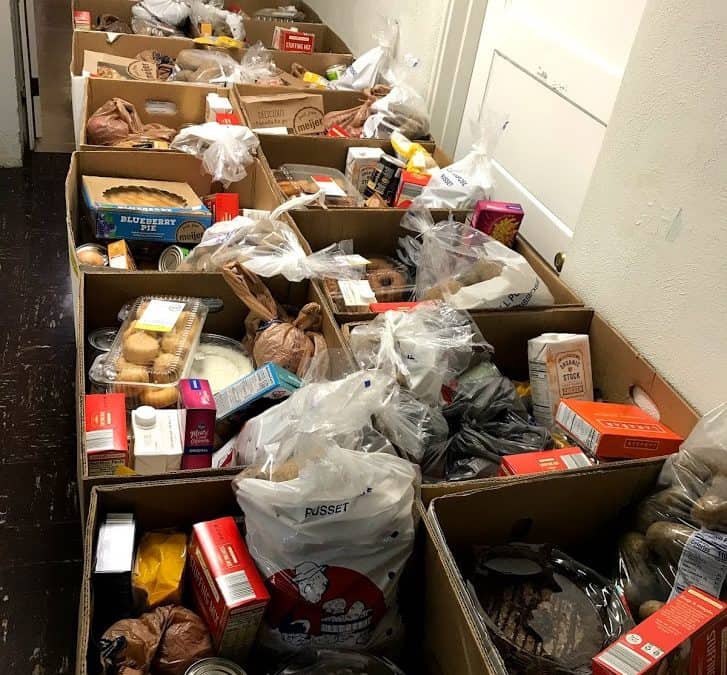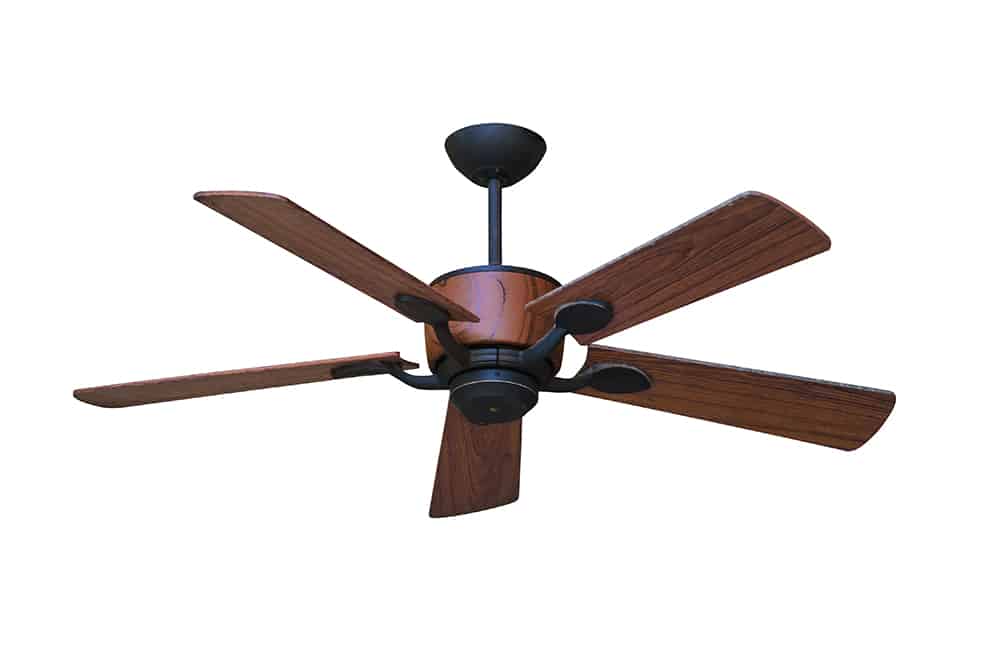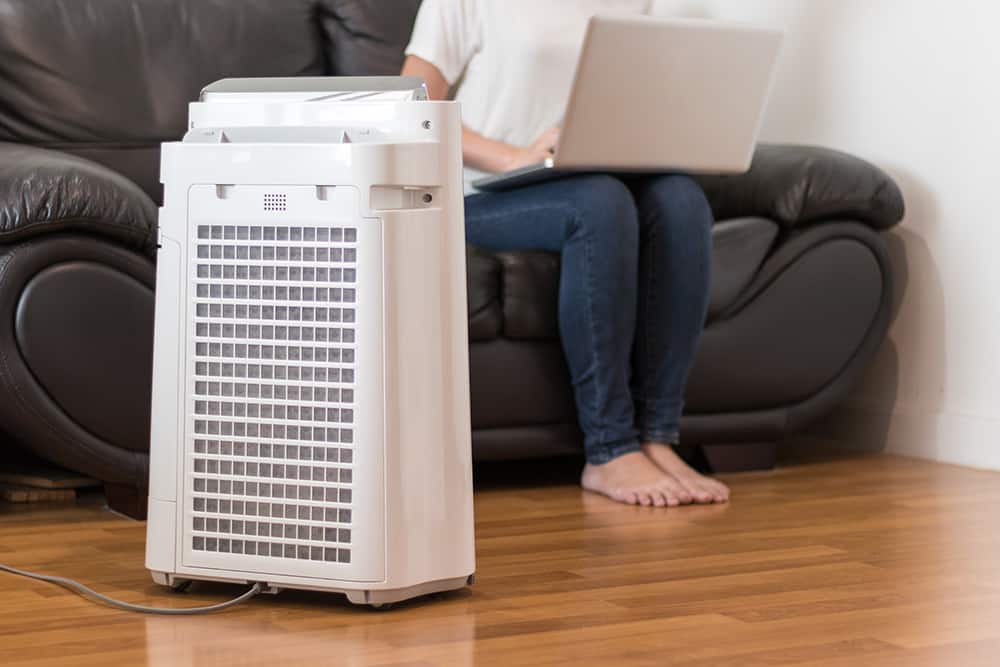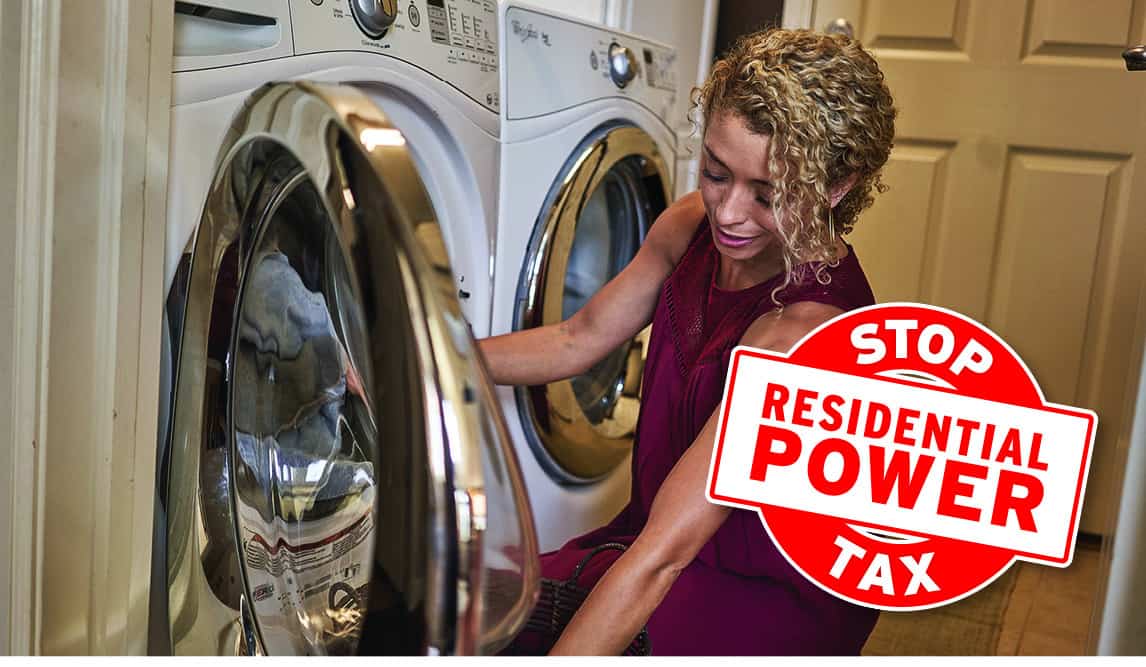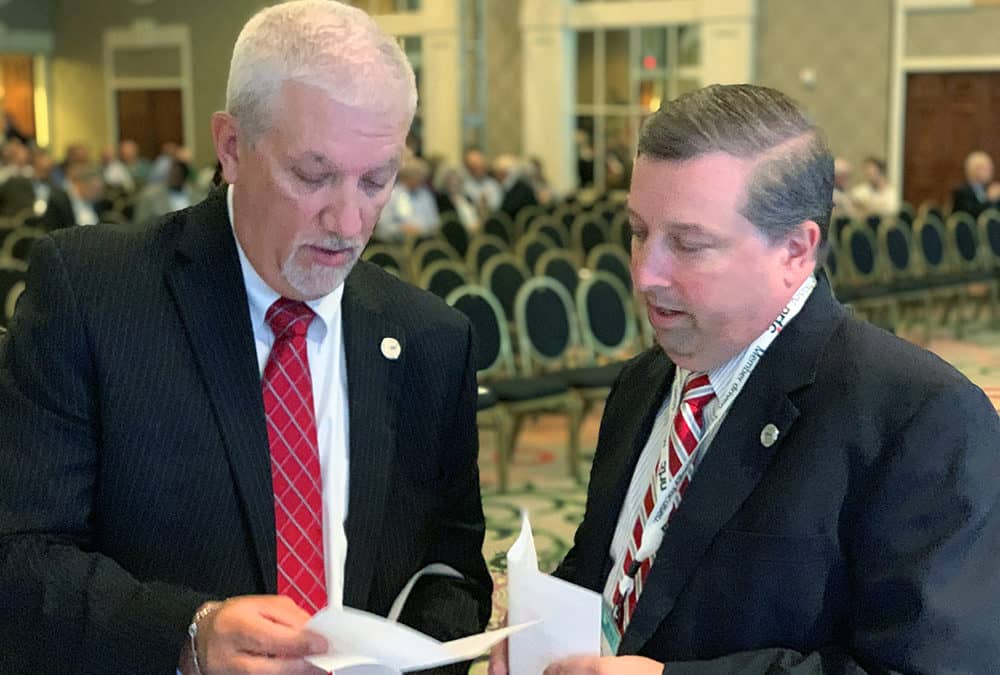Congratulations to the employees of ET&S (Energy Transmission and Substation) for reaching 10 years without a lost-time incident! ET&S employees work in all conditions to repair and maintain power service, so safety is paramount. A decade of work without a lost-time incident is an impressive safety milestone that wouldn’t be possible without employees dedicated to making that happen for themselves and their coworkers.
Author: Wade Harris
Blue Grass Energy is donating $21,570.53 to Kentucky Wounded Heroes
Powered by the cooperative’s purpose of making life better, the cooperative way, employees organized fundraisers throughout 2019 to raise the money. This total is the largest yearly total collected since Blue Grass Energy began their corporate charity program. Over the last six years, employees have raised and donated over $106,000 to local charities. Thank you to all employees and Blue Grass Energy members who helped make this donation possible!
Nucor and Kentucky co-ops: A powerful partnership
When Nucor Corp., America’s largest steel producer, decided to expand its operations in North America, it chose Kentucky—specifically, two sites served by electric cooperatives.
“Access to affordable and reliable power was a major reason we chose to expand our Gallatin mill and locate our new plate mill in Kentucky. We’ve enjoyed a great working relationship with the state’s electric cooperatives, so it made sense to continue to grow here,” says John Farris, Nucor Steel Gallatin’s vice president and general manager.
Nucor Steel Gallatin, a mill producing flat-rolled coils in Ghent, is served by Owen Electric Cooperative in partnership with East Kentucky Power Cooperative, its wholesale energy provider.
After a substantial investment in 2017 of $176 million to add galvanizing and pickling lines to the Ghent facility, Nucor is investing $650 million to nearly double the mill’s annual capacity to approximately 3 million tons.
“Nucor’s continued investment at their Ghent facility has led to tremendous job creation and economic prosperity in the region,” says Michael Cobb, interim CEO of Owen Electric. “We appreciate our strong working relationship with Nucor and value the opportunity to serve as their electric power supplier.”
Meanwhile, about 120 miles downstream on the Ohio River in Brandenburg, Nucor is investing $1.35 billion in a new steel plate manufacturing mill slated to open in 2022 at the Buttermilk Falls Industrial Park, served by Meade County RECC in partnership with Big Rivers Electric, its wholesale energy provider.
“Big Rivers and Meade County RECC staff have fostered a productive relationship with Nucor officials to bring their Brandenburg steel plate facility to operation on schedule and economically,” says Marty Littrel, Meade County RECC’s president and CEO. “We are excited about the future and the economic growth that will follow Nucor’s presence in the region.”
In addition to an estimated 2,000 construction jobs, Nucor’s new mill is expected to create about 400 full-time positions with an average annual wage of $72,000.
South Kentucky RECC Disbursing More than One Million Dollars to Members
For the second year in a row, the Board of Directors of South Kentucky Rural Electric Cooperative Corporation has announced the co-op is mailing $1,604,397 in capital credit refunds to members this week. The refunds from South Kentucky RECC total $1.4 million for the years of 1986, 1987 and 1988. In addition, more than $200,000 is being returned to members from East Kentucky Power Cooperative, which generates the electricity and is owned by South Kentucky RECC and 15 other distribution cooperatives across the state. Capital credit refunds from SKRECC and East Kentucky Power will be delivered in one check to members. A member’s share of this refund is based upon the amount of electricity used in the specified years in relation to the electric usage of all members at that time. In the world of co-ops, when revenues are greater than expenses, the difference is called a margin, and shares are not paid to investing stockholders, as an investor-owned utility would do. They are shared among the member-owners of South Kentucky RECC—the people who get their electricity from the co-op. South Kentucky RECC CEO, Ken Simmons, said this is just one of the many benefits of being a member-owner of an electric cooperative. “It gives the Board and myself great pleasure to be able to send these patronage capital checks to our membership. It affirms what our mission statement says – that we were ‘formed for people, not profit.’ We believe in this mission statement and strive to do the best that we can for our members.”
New Year’s resolution: Act now— and later—to cut energy costs
Some energy efficiency programs have indeed achieved those kinds of results. Get started by looking at some energy saving measures you can do right away for quick savings, and those you can plan for the future for even greater savings.
Dialing for dollars
NOW In most homes, the largest portion of the energy bill goes toward heating and cooling, so set back your thermostat by 7 to 10 degrees for eight hours a day. In winter, aim for 56 degrees at night and when no one is at home, and 68 degrees when you’re up and around. Throw on a sweater. Note that this tactic is not as effective for some homes with radiant heat systems and it is not recommended to change thermostats on heat pump systems more than 1 or 2 degrees.
LATER Adjust your air conditioning settings this summer. If you have a manual thermostat, consider purchasing a smart or programmable one.
Chilly efficiency
NOW Make sure your refrigerator and freezer aren’t set to a colder temperature than needed. The fridge should be at 38 degrees to 40 degrees and the freezer compartment should be set at 5 degrees. If you have a separate chest freezer, set it to zero. On the flip side, set your water heater to 120 degrees.
LATER If you’ve got an old refrigerator or freezer, replace it with a new, energy-efficient model or get rid of it. The refrigerator in the garage that you use to chill drinks could be costing you around $200 a year.
Bright moves
NOW The obvious: turn off lights when not in use. Replace the incandescent bulbs that you use most with LED bulbs, which last longer and use less energy. Prices on LED bulbs have decreased.
LATER Replace all your old incandescent bulbs over time, and consider smart, programmable lighting options.
Draft dodging
NOW Look for signs of air leaks. Block gaps under exterior doors with a towel or install weather stripping. Make sure windows are caulked, and seal areas around plumbing and wiring penetrations.
LATER Have an energy auditor do a blower door test, which is the best way to identify all air leaks. In fact, an energy audit can help you develop an overall plan for your home. KL
PAT KEEGAN and BRAD THIESSEN write on energy efficiency for the National Rural Electric Cooperative Association.
Giving back this holiday season
The Kentucky statewide office and United Utility Supply are giving back to the community during the holidays! Employees donated over 275 non-perishable items to the Dare to Care Food Pantry located at Lighthouse Christian Church in Louisville. Volunteers served a chili supper and were able to provide 50 food boxes to families in need. We are proud to support one of the cooperative business principles- Commitment to Community.
A fan of winter: Using ceiling fans can save on energy costs in winter
Most people know ceiling fans can keep you cooler in the summer, but did you know they also can help warm a home in winter?
In warm months, ceiling fans are set to rotate counterclockwise to create a breeze that cools the skin, though they don’t actually cool the air. In the winter, you should set your fan to clockwise rotation. This pushes down warm air—which rises—and redistributes the heated air through the room. Though this won’t warm the whole house, some studies have shown reversing your ceiling fan in the winter can save as much as 15% on heating costs.
To prevent a too-drafty chill, turn the fan on the lowest speed setting. It may take some adjustments to get the right blend of warm air without a cool draft. With a high vaulted ceiling, it may not even be necessary to reverse the rotation if the fan is set on a low speed.
It’s easy to change the direction on most modern ceiling fans. Just turn off the fan and locate the direction switch, usually on the fan motor housing. Flip the switch and turn the fan back on.
A ceiling fan with a built-in heating element is another option for winter. It still can be used in summer like a regular fan with the heating element switched off. And for balancing temperatures in a two-story home, try mounting a ceiling fan at the top of an open staircase.
—Madelynn Coldiron
Breathe easy: Tips for using room air cleaners
The most important factor in a room air cleaner isn’t the size or price of the unit, but the type of filtering material inside.
For the most effective air cleaning, particularly during winter, use a high-quality central heat pump/furnace air cleaner along with room air cleaners. Some newer central air cleaners are effective, but they remove only the particles that get into the duct system.
When you plop down on a sofa or walk on the carpeting, a cloud of allergen particles will fill the air. Some of these particles are relatively large and settle out of the air before they ever get near the furnace return air registers. An efficient room air cleaner can remove many of these particles using minimal electricity.
Instead of relying on advertising, use the CADR (clean air delivery rate) rating to compare air cleaners’ effectiveness. The Environmental Protection Agency and the American Lung Association recognize the CADR data as accurate and realistic.
Match cleaner to particles
First, have your children tested to determine what airborne allergies they have, and then choose an air cleaner based on the type of particles pinpointed. Three of the most common types of particles in room air are household dust, tobacco smoke and pollen. These cover the size range of most other typical airborne particles. The CADR ratings use separate numbers for the three types and the rating system also indicates the maximum room size for which the air cleaner will be effective.
For example, an electrostatic air cleaner with washable cartridges is effective for tiny smoke particles, but a media filter is better for removing larger pollen and mold spore particles. A HEPA filter removes most particles, but its powerful fan uses more electricity. HEPA and media air cleaners require periodic filter element replacements.
If your allergies are with the larger particles, turn off the air cleaner if the room will not be used an hour or more. These larger particles settle back down and will not be significantly removed with continuous operation.
JAMES DULLEY is a nationally syndicated columnist who writes on energy efficiency and do-it-yourself energy topics.
No sales tax on your power bill
I need your help to keep your electric bill as affordable as possible.
Ahead of the Kentucky General Assembly convening for its budget session in January, I urge you to tell your legislators not to add any sales tax on residential power bills.
Connecting with your specific lawmakers is made easy on our new grassroots website, RuralPowerKY.com. Simply fill in your address and the website will have an email ready to send to your senator and representative.
Under current law, residential electric bills are exempt from the state’s 6% sales tax. However, as the General Assembly continues to consider new sources of revenue, potentially removing more exemptions from the sales tax, co-ops are urging legislators to protect the exemption on residential electric bills.
Since we launched this campaign in October, we are thankful that some lawmakers have affirmed they would not consider this proposal. Even if you want to thank your legislators for opposing this tax, it is important that they still hear from you and understand that you care about this.
The way co-ops judge every expenditure is whether it helps us serve our consumer-members. A tax on every residential power bill would not help us serve our members. By keeping costs as low as possible, co-ops not only help household budgets, but also economic development in communities across rural Kentucky.
Chris

Rural act to fix tax law unintended consequence
Electric cooperative leaders from Kentucky are joining co-ops across America calling on Congress to fix an unintended consequence of changes to federal tax law, warning that co-ops risk losing their nonprofit status if a major ice storm or tornado strikes a state.
To maintain tax-exempt status, no more than 15% of a co-op’s annual gross income can come from sources other than co-op members. Under the new law, government grants are considered non-member income—increasing the risk that co-ops working to restore their systems after major storms or help their community will be forced to forfeit their tax-exempt status.
Other federal or state government funding that could fall into this category are grants for economic development, energy efficiency and rural broadband deployment.
Without tax-exempt status, co-ops will be forced to return a significant portion of those funds to the government in taxes rather than using the monies for their intended purpose.
“These changes leave a cloud of uncertainty hanging over electric co-ops,” says Marty Littrel, president and CEO of Meade County RECC, one of 26 electric cooperatives in Kentucky. “This uncertainty puts co-ops and their communities in a difficult position as they work to plan for the future.”
The Rural Act is bipartisan legislation that would correct this mistake. Co-sponsors include Kentucky Congressmen Andy Barr and James Comer.
—Joe Arnold


